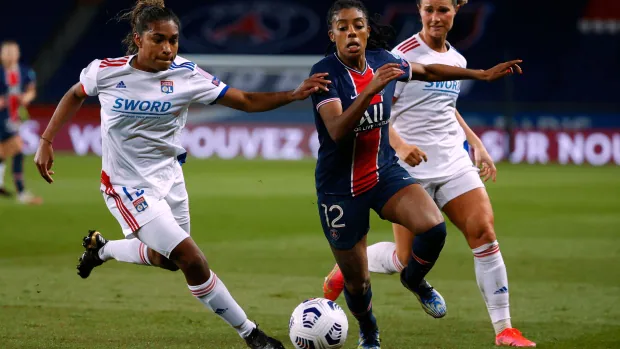
Four members of the Canadian soccer team that won gold at last summer’s Tokyo Olympics will take centre stage during this week’s quarter-final round of the UEFA Women’s Champions League.
On Tuesday, a Paris Saint-Germain side featuring fullback Ashley Lawrence and forward Jordyn Huitema will travel to Germany to take on Bayern Munich in the opener of their two-game series.
On Wednesday, Italian outfit Juventus (with Canadian midfielder Julia Grosso) hosts French club Olympique Lyonnais, with whom veteran defender Kadeisha Buchanan has previously won four Champions League titles.
In this week’s other first leg contests, Spanish rivals Real Madrid and Barcelona clash, while English club Arsenal welcomes Germany’s Wolfsburg to London.
This annual competition that brings together the best clubs from across Europe was first staged in 2001-02 under the moniker of the “UEFA Women’s Cup,” before being rebranded the Champions League in 2009-10. The Women’s Champions League has grown by leaps and bounds since then, with the biggest change coming at the start of this season with the introduction of a proper first-round group stage.
The new format means that for the first time both the women’s and men’s tournaments are aligned with each other. It also means greater revenue for the clubs involved with an increase of games on the schedule, which is another plus for advancement of the women’s game at the pro level.
“Having more matches is always a plus. The new format, with a group stage, it allows for more games, it allows for more teams to play across Europe, so it’s only positive in terms of the progression and growth of the women’s game on a global scale,” Lawrence told CBC Sports.
WATCH | Lawrence a nominee for Ballon d’Or:
Canadian Olympic gold medallists Christine Sinclair, Ashley Lawrence and Jessie Fleming are on the shortlist for the Ballon d’Or this year after successful domestic and international campaigns. Learn more about the 3 Canadians who could win the Ballon d’Or, soccer’s most prestigious individual 2:11
Lawrence, a 26-year-old from Toronto, was one of Canada’s most important and durable players at the Olympics, starting all six games and logging 591 minutes out of a possible 600 of playing time. Like she has for most of her national team career, she proved to be a versatile option for national coach Bev Priestman, as she was deployed both as a fullback and midfielder in Tokyo.
She was also a major contributor for a PSG side that won a historic French league championship last season (ending Olympique Lyonnais’ run of 14 consecutive titles), and reached the semifinals of the UEFA Women’s Champions League for the second year in a row. The run to the final four was especially sweet for Lawrence and PSG as they beat Lyon (who were the defending five-time European champions) in the quarter-finals.
A former NCAA star at the University of West Virginia, Lawrence has come into her own since signing with PSG right out of the college ranks in 2017. It was a huge step to take at the time for such a young and unproven player. But Lawrence has been one of PSG’s most consistent contributors since her arrival.
Playing in France’s first division and in the UEFA Women’s Champions League has allowed her game to develop and grow. The Canadian women’s team has also benefited, as Lawrence has become a more well-rounded player, and is widely regarded among the best fullbacks in the world.
“Being at this club for several years now, I’ve seen the development of the women’s game and being a part of the Champions League, it’s been key. It’s known around the world,” Lawrence said. “I’ve been a part of games against top clubs — Lyon, Barcelona, and Bayern Munich — and they’re always neck-and-neck for 90 minutes. It pushes you, and that’s what pushes me as a player and has helped me progress.
“It’s helped me get out of my comfort zone and at PSG we’ve really had to improve our game over the years. We’ve got better in the competition, getting to the semis last year, so it just shows the amount of work and attention to detail it takes to win it.”
Buchanan’s game has evolved
Buchanan, a 26-year-old from Toronto, has similarly evolved during her tenure in France with Olympique Lyonnais, and by regularly testing herself against some of the best players in the world in the Champions League.
“Coming out of college and having a few caps for Canada, most of my play was physical,” Buchanan told CBC Sports. “I was very physically dominant, fast, strong on the ball and strong in my tackles. When I came to France, that wasn’t the style of play. It was more possession-based, very technically sound.
“That helped me gain better control on the ball and precision with my passing ability, and really looking at different types of passes, like hitting a diagonal on a dime, or a split pass. So, my game has improved from being a physical player to where I feel like over the last [few] years I’ve got a lot better on the technical side.”